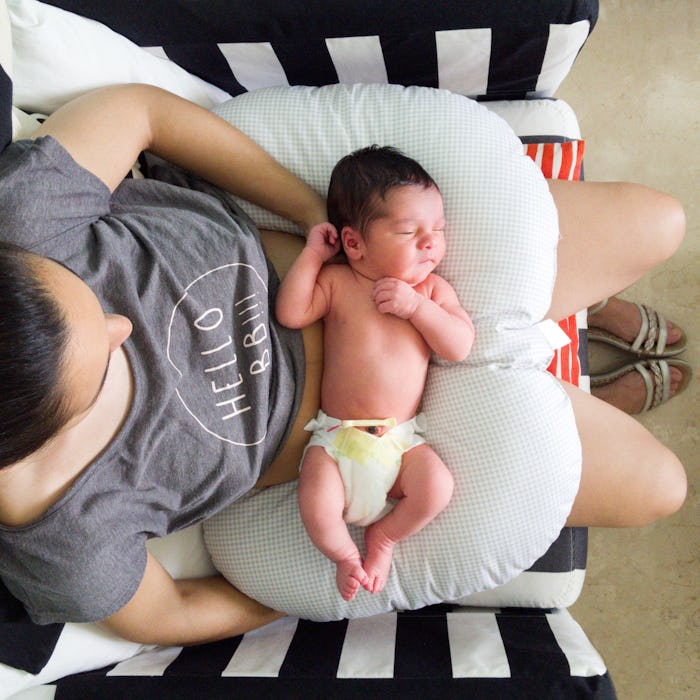Five months after she became a mom and began to experience sleep deprivation, Monique Compton’s hallucinations began. Her cuddly little bundle of joy never slept more than two hours at a time, and when he woke, it would often take hours to get him back to sleep.
TW: This article discusses intrusive thoughts.
Compton, a 45-year-old stay-at-home-mother in the Phoenix area, had struggled with fertility issues for many years, and was ready for sleep challenges, colic and just about anything her baby would present. Except hallucinations.
For Compton — along with many new parents — hallucinations are yet another unexpected side effect of having a baby.
A 2018 study published in Frontiers in Psychiatry found that after 24 to 48 hours of sleep loss, participants experienced anxiety, perceptual distortions, irritability, depersonalization and temporal disorientation. Next came complex hallucinations and disordered thinking. Delusions began after 72 hours, and at this point, the subjects resembled the clinical picture of acute psychosis or toxic delirium.
“Your brain becomes equivalent to being drunk,” says Dr. Harvey Karp, CEO of Happiest Baby and creator of the SNOO Smart Sleeper bassinet.
In Compton’s case, she began worrying about her sanity and her ability to keep her baby safe.
Most of her hallucinations were brief moments of seeing things late at night, like thinking she saw her husband leave the room — but noticing him snoring next to her. Or seeing the light on the humidifier flitting around like a glowing butterfly.
It was her waking dreams that were even more terrifying.
“One of the worst was at night when I was breastfeeding,” Compton says. “I saw my baby’s head detach and roll away off the pillow onto the bed. In a panic, I reached for it, but it kept rolling around the grooves of the comforter.”
Compton says her heart was pounding and she broke out in a sweat, feeling exactly like she’d expect to feel if her baby were severely injured.
While sleep deprivation is expected when you’ve got a baby, it’s not healthy, and can have dangerous consequences.
Unfortunately, sleep-related hallucinations can occur in as many as 25 percent of people, according to the American Sleep Association. And since adults need seven to nine hours of uninterrupted sleep nightly, and new parents only average five hours of interrupted sleep per night, hallucinating is a real concern. If new mothers miss two hours of sleep per night for the first 4-5 months, that’s 240-300 lost hours in the first six months — and for at least a third of babies, sleep issues persist beyond six months, says Karp, who wrote the bestselling Happiest Baby On The Block.
Add to that other repercussions of parenting, and it’s surprising that we all don’t suffer from it.
“Sleep deprivation, a traumatic birth, the drugs used during the labor and immense pressure placed on new parents can all lead to hallucinations,” says Courtney Zentz, a certified lactation counselor and owner of Tiny Transitions Infant & Toddler Sleep Solutions.
But while sleep deprivation is expected when you’ve got a baby, it’s not healthy, and can have dangerous consequences, including the hallucinations and more. Plus, you’re expected to figure out how to take care of your new bundle on top of it all.
Short of not having a baby, you’re probably going to suffer. But there are some things you can try to help your baby — and you — get that much needed sleep.
Karp suggests swaddling the baby until he is 2 months old, in addition to using white noise and motion. These actions mimic the womb, where your baby felt comfortable (and sleepy). The SNOO was designed with the “five S’s” in mind — it swaddles babies, offers sound and motion, and secures the baby to the bed.
Implementing a sleep routine will also be helpful, says Bill Fish, co-founder of Certified Sleep Science Coach. Teeth, pajamas, book — or any routine that you establish — will teach your child’s body and mind that it’s time to get ready for bed.
Setting the stage for your baby to learn to self-sooth can be helpful, as can asking a partner or relative to take over while you catch up on sleep.
But if all else fails, here’s the good news: the hallucinations and sleep-related trauma will pass. Eventually.
The 2018 study mentioned above found that the psychotic symptoms which developed from a lack of sleep are likely to resolve after sleeping, although more information is needed to identify the factors that contribute to the prevention of the symptoms. Our guess: getting sleep would prevent the symptoms.
We still don’t know how much sleep is needed to make a full recovery. For Compton, the hallucinations and other sleep-related issues started to wane after her son started to sleep for 4-5 hour stretches.
“I was able to gain some rational perspective and finally relax after 1-and-a-half years of crippling anxiety,” Compton says.
Eventually, that full recovery will arrive for every sleep-deprived parent. Along with the much-needed sleep.
